
Iran’s Ministry of Intelligence has accused 53 Christians of espionage and anti-security activities after arresting them in recent weeks. State media aired a video showing some of the detainees alongside confiscated Christian literature, including Bibles, and alleged that they had smuggled these items into the country.
The report, which also included surveillance footage and forced confessions, claimed the Christians had received religious training abroad and were part of an Evangelical network tied to foreign intelligence, reported Article18, a London-based religious liberty watchdog group.
Screenshots from the video showed New Testaments, Christian texts, and Alcoholics Anonymous handbooks, which officials said were being circulated covertly.
Mansour Borji, director of Article18, described the accusations as “a very clear example of hate speech” and said they target not only the arrested individuals but the broader Evangelical Christian community in Iran.
“The clear suggestion being made here is that all Evangelical Christians are associates of Mossad,” Borji said, adding that the accusations made on state television hadn’t been proven in court and that such broadcasts violated the basic rights of the accused.
Borji criticized the inclusion of forced confessions in the broadcast, noting that they’re rarely aired on national television. He said if Iranian authorities were confident in their claims, they would permit an international delegation to speak to the detainees.
Borji also questioned why Persian-speaking Christians have no recognized churches and are forced to hold gatherings outside the country.
In January, Article18 organized an event in Geneva, Switzerland, featuring officials from the United Nations, which noted that Christians in Iran are routinely arrested on vague national security charges and punished for ordinary acts of worship such as baptisms, Christmas celebrations, or group prayers. These charges effectively criminalize religious practice and limit the freedoms of expression, association and belief.
In June, five Christians were indicted for “gathering and collusion” and “propaganda against the Islamic Republic,” with the charges citing acts such as praying and baptizing. The indictment referred to the Bible as a “prohibited book.” Two Christian converts were sentenced in April to 12 years in prison each for possessing multiple copies of the Bible, according to Article18.
The Iranian Ministry of Intelligence announced the arrests as part of a larger crackdown following the “12-day war” with Israel, ZENIT News reported. Authorities falsely claimed the arrested Christians had been “trained abroad” by churches in the United States and Israel, and were acting “under the guise of the Zionist Christian evangelical movement.”
The crackdown, described by authorities as targeting groups involved in “activities contrary to security,” also included the arrest of Bahá’ís, Kurds, Baluchis, monarchists, and journalists. Police claimed they had detained over 21,000 people as suspects during the same period.
The Iranian government has long differentiated between Evangelical Christians — often converts from Islam who are not officially recognized — and historic Armenian and Assyrian Christian communities.
The latter are allowed to worship in their own languages but cannot conduct services in Persian or admit Iranian Muslims. Most of the estimated 800,000 Christians in Iran today are converts who lack any legal place of worship.
Borji explained that many Iranian Christians rely on online resources or attend religious meetings abroad, as domestic gatherings are restricted. He said some of the recently arrested individuals had attended a Christian event in a neighboring country, as such gatherings were unavailable to them at home. They were arrested upon their return.
The ministry’s accusations that Christians were being trained for “anti-security purposes” are “absurd,” Borji said, and amount to an attempt by the Iranian agency to deflect blame for its failures during the war with Israel. “They targeted the most vulnerable and easy-to-find scapegoats,” he added.
ZENIT quoted human rights lawyer Hossein Ahmadiniaz as saying that the accused are unlikely to receive a fair trial in Iran’s judiciary, which lacks independence and routinely denies political and religious defendants access to legal counsel.
“All those arrested on charges of security, political, ideological or ‘espionage’ offences are denied a fair trial, subjected to severe torture and do not even have access to an independent lawyer,” Ahmadiniaz said.
At least 11 of the Christians arrested have been released on bail, but more than 40 remain in custody. Over 60 others are already serving prison sentences.
In 2022, the U.S. Commission on International Religious Freedom cited Iran for “systematic” and “egregious” violations in its treatment of religious minorities.
















